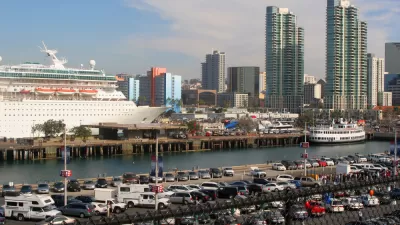A sand mine that has been operating since the very beginning of the 20th century has finally been shut down by California regulators. The site of the facility will be returned to more natural conditions.

Paul Rogers reports: "The last coastal sand mine in the United States, a Monterey Bay plant that scientists say has caused significant erosion of beaches in the area, will close in three years under a settlement agreement announced Tuesday with California officials."
The facility, the CEME Lapis plant has been operating with a license from the state, "claiming that its operations pre-date state laws such as the 1976 Coastal Act," according to Rogers. The facility produces an estimated 200,000 to 300,000 cubic yards of sand a year.
The turning point in the state's protracted battle against the facility came in May 2017, when the California State Lands Commission threatened legal action against the company. "The company already was under investigation from the California Coastal Commission and was facing years of protracted litigation and potential fines," according to Rogers.
For more on the end of the last coastal sand mine in the United States from the standpoint of some of the advocates who fought the facility, see a post by Jennifer Savage for the Surfrider Foundation.
FULL STORY: Controversial beachfront sand mining operation along Monterey Bay to close

Maui's Vacation Rental Debate Turns Ugly
Verbal attacks, misinformation campaigns and fistfights plague a high-stakes debate to convert thousands of vacation rentals into long-term housing.

Planetizen Federal Action Tracker
A weekly monitor of how Trump’s orders and actions are impacting planners and planning in America.

In Urban Planning, AI Prompting Could be the New Design Thinking
Creativity has long been key to great urban design. What if we see AI as our new creative partner?

King County Supportive Housing Program Offers Hope for Unhoused Residents
The county is taking a ‘Housing First’ approach that prioritizes getting people into housing, then offering wraparound supportive services.

Researchers Use AI to Get Clearer Picture of US Housing
Analysts are using artificial intelligence to supercharge their research by allowing them to comb through data faster. Though these AI tools can be error prone, they save time and housing researchers are optimistic about the future.

Making Shared Micromobility More Inclusive
Cities and shared mobility system operators can do more to include people with disabilities in planning and operations, per a new report.
Urban Design for Planners 1: Software Tools
This six-course series explores essential urban design concepts using open source software and equips planners with the tools they need to participate fully in the urban design process.
Planning for Universal Design
Learn the tools for implementing Universal Design in planning regulations.
planning NEXT
Appalachian Highlands Housing Partners
Mpact (founded as Rail~Volution)
City of Camden Redevelopment Agency
City of Astoria
City of Portland
City of Laramie





























